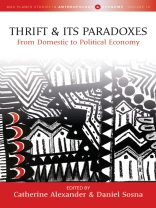Thrift is a central concern for most people, especially in turbulent economic times. It is both an economic and an ethical logic of frugal living, saving and avoiding waste for long-term kin care. These logics echo the ancient ideal of household self-sufficiency, contrasting with capitalism’s wasteful present-focused growth. But thrift now exceeds domestic matters straying across scales to justify public expenditure cuts. Through a wide range of ethnographic contexts this book explores how practices and moralities of thrift are intertwined with austerity, debt, welfare, and patronage across various social and temporal scales and are constantly re-negotiated at the nexus of socio-economic, religious, and kinship ideals and praxis.
表中的内容
List of Illustrations
Acknowledgments
Introduction: Thrift, Anti-thrift, Scale, and Paradox
Catherine Alexander and Daniel Sosna
Chapter 1. Making Savings
Stephen Gudeman
Chapter 2. Saving, Investment, Thrift? Welfare Beneficiary Households and Borrowing in South Africa
Deborah James, David Neves, and Erin Torkelson
Chapter 3. Wages, Patronage, and Welfare: Thrift and its Limits in Argentina’s Gran Chaco
Agustin Diz
Chapter 4. Generous Thrift: Post-Pastoral Cooperation and Fortune-making among the Torghut of Mongolia
Tomasz Rakowski
Chapter 5. Discretio and the Golden Mean: Working Out Frugality and Thrift in Two Czech Post-Socialist Monasteries
Barbora Spalová
Chapter 6. Regimes of Asceticism: Austerity and Thrift in a Spiritual Economy
Daromir Rudnyckyj
Chapter 7. Saving and Wasting: The Paradox of Thrift in a Czech Landfill
Daniel Sosna
Chapter 8. Thrift and its Opposites
Richard Wilk
Afterword
Chris Hann
Index
关于作者
Daniel Sosna is a senior researcher in the Department of Ecological Anthropology, Institute of Ethnology, Czech Academy of Sciences. Sosna is a specialist on ethnographic and archaeological research of waste regimes with a regional focus on Central Europe. He co-edited the book Archaeologies of Waste: Encounters with the Unwanted (Oxbow Books, 2017).












